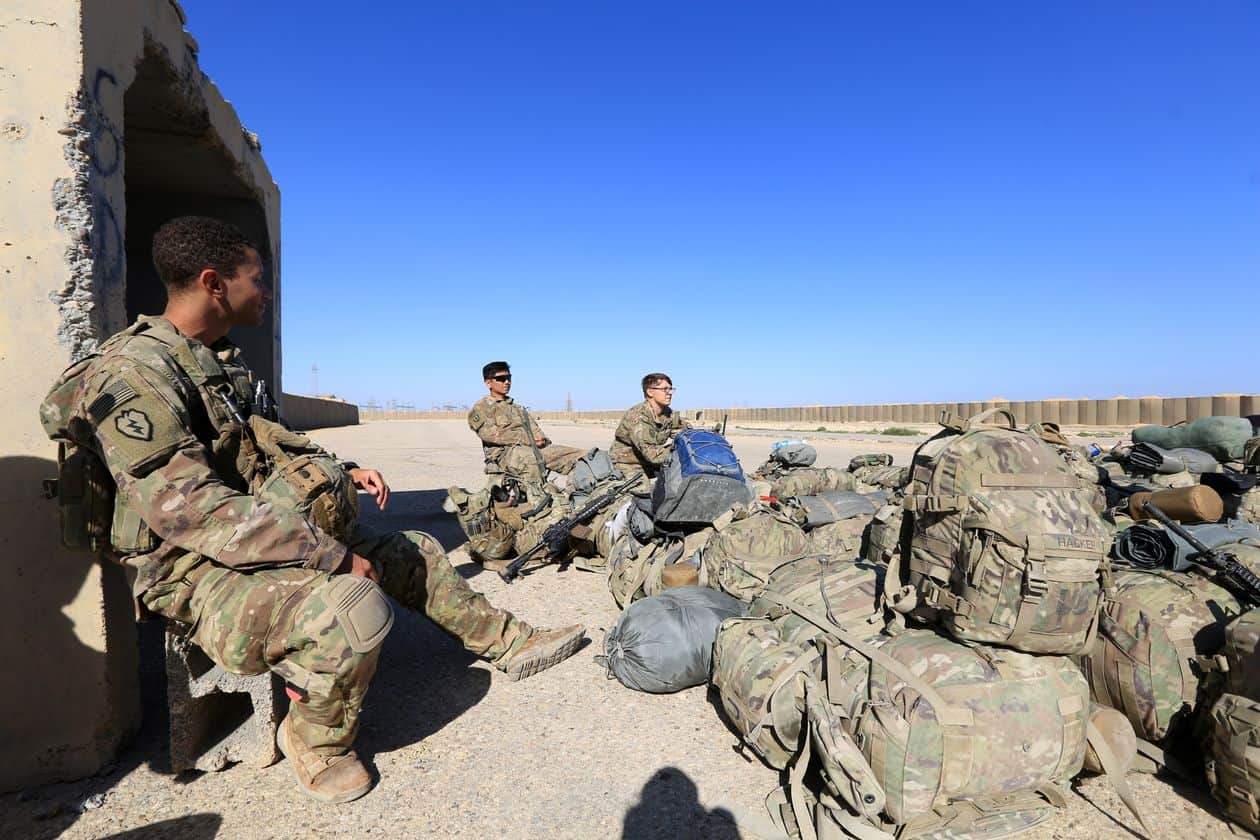Militants in Iraq Take Covert Approach to Anti-U.S. Campaign

The Iran-backed groups trying to drive U.S. troops out of Iraq have moved to a more clandestine approach that further complicates the Trump administration’s response to attacks against American forces.
Marking a shift in a campaign the U.S. has blamed on established Iran-backed militias, an unknown group calling itself the League of Revolutionaries claimed responsibility for the most recent deadly attack, when rockets fired at an Iraqi base on March 11 killed two American troops and a British soldier.
“The incentive now is to create new groups that can carry out the dirty work,” said Ramzy Mardini, a scholar at the U.S. Institute of Peace, a Congress-funded think tank in Washington. “You can’t do coercion effectively if the U.S. can locate you and retaliate.”
As tensions have escalated between the U.S. and Iran, Iraq has emerged as the primary battleground, with more than two dozen rocket attacks targeting American troops in the past six months.
Hostilities in Iraq between the U.S. and Iran intensified in January, after the U.S. killed Iranian Maj. Gen. Qassem Soleimani and Iran responded with a barrage of ballistic missiles fired at two bases housing U.S. troops.
“Having—very unusually for [the Iranians]—conducted an attack they took credit for, they now intend to move back into the gray zone and do things [for which] they believe they have plausible deniability,” a U.S. official said after the ballistic-missile attack.
A series of retaliatory strikes by the U.S. has failed to deter militant assaults, which Washington blames on Iraqi Shiite militias and their patron, Iran. Tehran denies involvement, as does Kataib Hezbollah, the militia the U.S. has singled out and targeted with airstrikes.
Facing increased threats, the U.S. has begun moving troops out of smaller, vulnerable outposts to larger bases that can be more easily protected. The hostile environment in Iraq has undermined the fight against Islamic State, as U.S. forces devote greater attention to protecting themselves.
Iranian officials and their allies in Iraq have said their ultimate goal is for U.S. troops to leave the country. The latest intensification of rocket attacks came as efforts to force American troops out through political channels lost steam.
By forming new groups, militants can attack U.S. troops while denying the involvement of established groups such as Kataib Hezbollah, which has vowed revenge for the killing of Gen. Soleimani and an Iraqi commander, who together oversaw militia groups in Iraq.
For the U.S., “it muddies the water in how to respond,” said Mr. Mardini.
The logo of the League of Revolutionaries incorporates elements of other Iran-backed militias. A senior military official with the U.S.-led coalition said the group appeared to be “the same old actors organizing themselves differently.”
Some Iraqi officials cast doubt on whether the organization exists, describing the video announcing its emergence as amateurish and noting that it offered no evidence it had conducted an attack.
Unlike previous attacks by Iraqi militias, one of those claimed by the new group was conducted in daylight and used a fixed—instead of a mobile—rocket launcher. The launcher was similar to those used by other Iran-backed forces, including Hezbollah in Lebanon and the Houthis in Yemen, according to Fabian Hinz, an arms researcher at the Middlebury Institute of International Studies in Monterey, Calif.
The formation of a new militant group is a tactic that was used by Iran and its allies against Americans to evade reprisals in the years following the 2003 U.S.-led invasion. The revival of the strategy appears aimed at deflecting blame from the established militias that became a formal part of the country’s security apparatus after the war against Islamic State, analysts and officials said.
Plans to form a new group appeared to predate the U.S. killing of the Iranian commander, Gen. Soleimani, an Iraqi official said, with the intention of dialing up pressure on the U.S. ahead of the presidential election in November.
“It is aimed at putting more pressure on the Americans to possibly assess that Iraq is not worth staying in,” said the official.
The U.S. has already begun resizing its footprint in Iraq. This month, it withdrew forces from the al-Qaim outpost on the border with Syria and said it planned to pull out of others in the coming months.
A military spokesman for Kataib Hezbollah hailed the withdrawal from al-Qaim as “the beginning of the defeat.”
The senior coalition military official said the repositioning of troops wasn’t driven by increased attacks and had been planned since 2019. He attributed the move to the success of Iraqi security forces.
Doubts remain, however, about the capabilities of Iraqi security forces, and Islamic State, while severely weakened, still poses a threat.
The coronavirus pandemic has also prompted the U.S.-led coalition to put the training of Iraqi security forces on hold and withdraw some of the troops involved.
Photo: U.S. forces in Iraq are moving from outposts such as al-Qaim, where these coalition soldiers took a break last week, to larger bases that can be more easily protected. Photo: Murtadha Al-Sudani/Anadolu Agency/Getty Images
Link: https://www.wsj.com/articles/militants-in-iraq-take-covert-approach-to-anti-u-s-campaign-11585220400?mod=world_major_1_pos7











